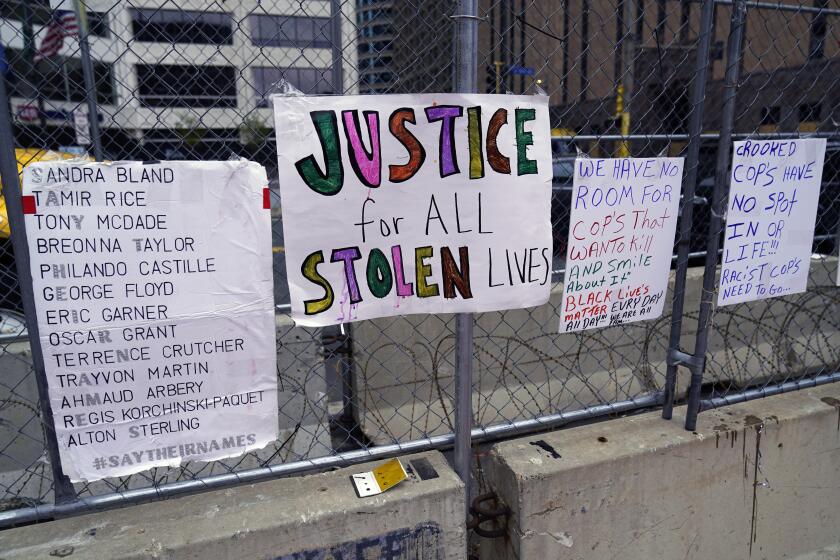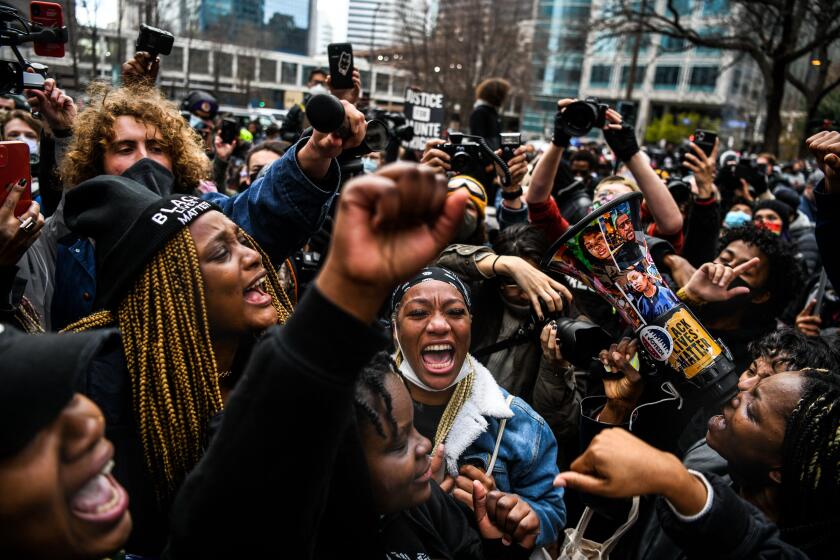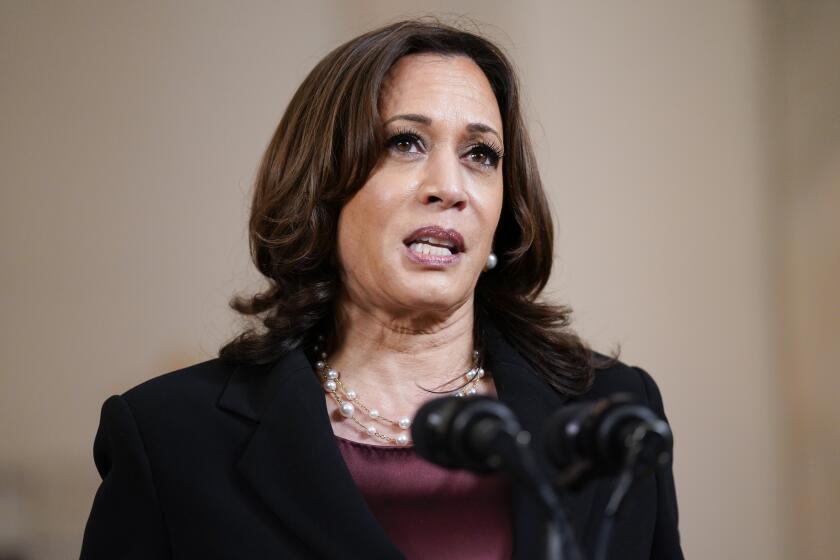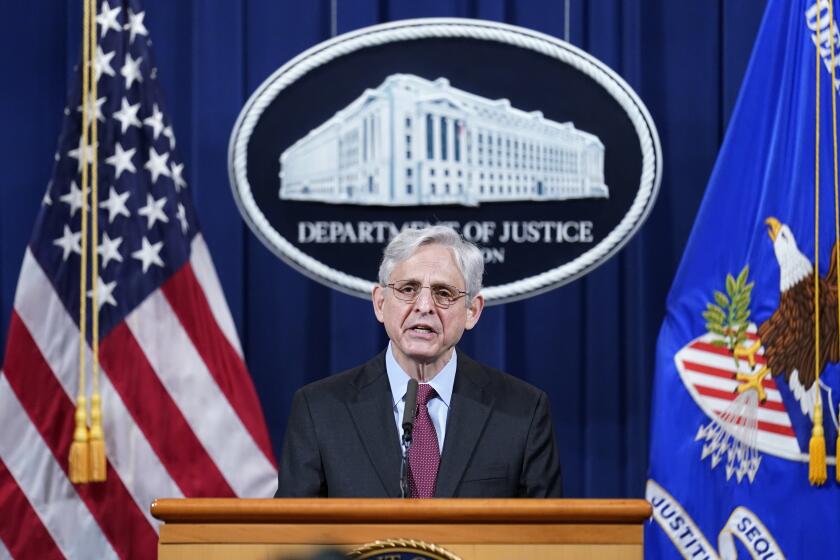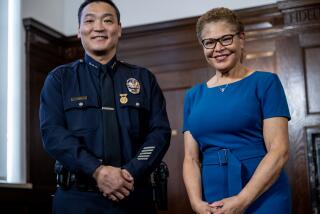Police chiefs hail Chauvin verdict as step toward healing: ‘This moment matters’
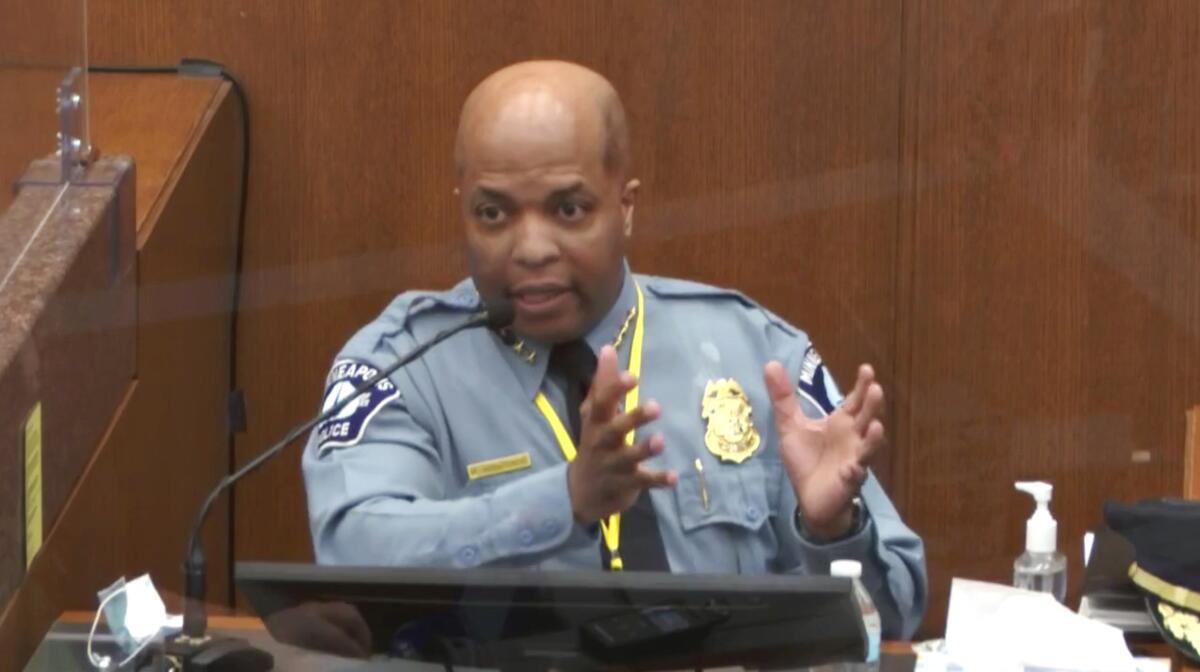
Not long after a jury convicted former Minneapolis Police Officer Derek Chauvin of killing George Floyd, police chiefs across the U.S. started speaking up. And it wasn’t to defend the police.
New Orleans Police Superintendent Shaun Ferguson said Chauvin’s conviction Tuesday showed “police officers are not above the law.” Charmaine McGuffey, the sheriff in Cincinnati, said it was a “necessary step” in healing a nation torn apart by police violence. Miami Police Chief Art Acevedo encouraged Americans to breathe “a collective sigh of relief.”
For the record:
6:58 a.m. April 22, 2021Previous versions of this article identified Shon Barnes as the first Black police chief in Madison, Wis., then as the second. He is the third.
Law-enforcement leaders said the verdict was a step toward restoring trust in the criminal justice system and repairing relations between police and the communities they serve. It was a major departure from years past, when even the highest levels would close ranks around an officer following an on-duty killing.
But police leaders and activists alike cautioned that a single case will not end systemic racism or stamp out excessive force in departments nationwide.
“The American justice system has not always served all of her people well, and the death of George Floyd is a shocking example of where we can fail each other,” said Madison, Wis., Police Chief Shon Barnes, who is Black. “As an officer of the law, I believe that today justice has prevailed. We hear you. This moment matters.”
At Chauvin’s trial, jurors saw video from bystanders and police body-cams and heard witnesses describe how Chauvin pinned his knee for a prolonged period on Floyd, who cried out: “I can’t breathe.”
It’s been rare for a police officer to be charged with a crime in the death of a civilian, and winning a conviction is hard.
Minneapolis Police Chief Medaria Arradondo testified against Chauvin, breaking the “blue wall of silence” that has long thwarted accountability for police wrongdoing. Arradondo told jurors that Chauvin’s conduct violated department policy, went against training and “is certainly not part of our ethics or our values.”
Activist Isaac Wallner said Chauvin’s conviction suggested that the country may be starting to take Black communities’ cries of police abuse seriously. But he said a single verdict won’t make him feel safe in his hometown of Kenosha, Wis., where no officers have been charged in last year’s shooting of Jacob Blake.
“Until that day happens when police are afraid to abuse their badge, I’ll continue to be afraid of the police,” Wallner told the Associated Press. “As of right now, they’re not afraid because too many of them have gotten off.”
Law enforcement leaders in cities large and small said the verdict was just a first step.
Across the country, people began to reflect on what it meant for a white officer to be convicted in the killing of a Black man.
“The work of doing justice for George Floyd doesn’t end today,” San Francisco Police Chief William Scott said. “My hope for all of us in criminal justice roles is that we rise to this moment, and learn the lessons that history has, frankly, been trying to teach us for decades.”
Darin Balaam, the sheriff in Washoe County, Nevada, said: “It is past time we hold law enforcement officers who tarnish our profession and oath accountable for deplorable actions.”
Acevedo, the Miami police chief and president of the Major Cities Chiefs Assn., said law enforcement leaders across the country took the unusual step last year of decrying Chauvin’s actions because the bystander video was “shocking to the conscious.”
“Anyone who would question the righteousness of this conviction, I would say they really need to take a good, hard look at their own gut because I question their humanity,” Acevedo told the AP on Wednesday.
Former Police Officer Derek Chauvin’s conviction for murdering George Floyd has reenergized President Biden and Washington lawmakers aiming for reform.
Even some police unions supported the verdict, but it’s unclear whether that sentiment was universal when the general practice is to defend officers immediately.
Patrick Yoes, president of the National Fraternal Order of Police, said the “trial was fair and due process was served.”
Unions for officers in Los Angeles, San Francisco and San Jose said the verdict “was just” and offered “an opportunity to improve how our nation is policed.” And the usually pugnacious head of New York’s officers union, Patrick Lynch, said: “What Derek Chauvin did that day was not policing. It was murder.”
Chauvin’s Minneapolis police union thanked jurors for their dedication but also criticized elected officials for what it deemed political pandering and divisive comments about police.
“There are no winners in this case, and we respect the jury’s decision,” the Police Officers Federation of Minneapolis said in a statement.
Atty. Gen. Merrick Garland announces an investigation into Minneapolis police after an ex-officer is convicted of murdering George Floyd.
The verdict was especially profound and complicated for Black officers, who see the struggles of policing and race in both their work and personal lives.
Terrance Hopkins, president of the Black Police Assn. of Greater Dallas, said he was relieved Chauvin was convicted but acknowledged that “it’s hard to see an officer take a fall like this.”
“It helps me to do my job because this is how we build trust,” said Hopkins, a senior Dallas police corporal. “The trust has been taken away by us not holding officers accountable.”
Tattered relations between police and communities have been driven by centuries of poverty, poor schooling and a lack of economic opportunity in “inner cities and very diverse communities,” said Malik Aziz, former executive director of the National Black Police Assn. and incoming chief in Prince George’s County, Maryland. Officers alone can’t address those issues, he said.
“Until we actually face those facts of any structural or institutional racism or discrimination or prejudice or poverty, then we’ll continue to see these things flourish,” Aziz said. “This should not be a day of celebration, but it should be a day for us to actually have a real dialogue.”
More to Read
Sign up for Essential California
The most important California stories and recommendations in your inbox every morning.
You may occasionally receive promotional content from the Los Angeles Times.
